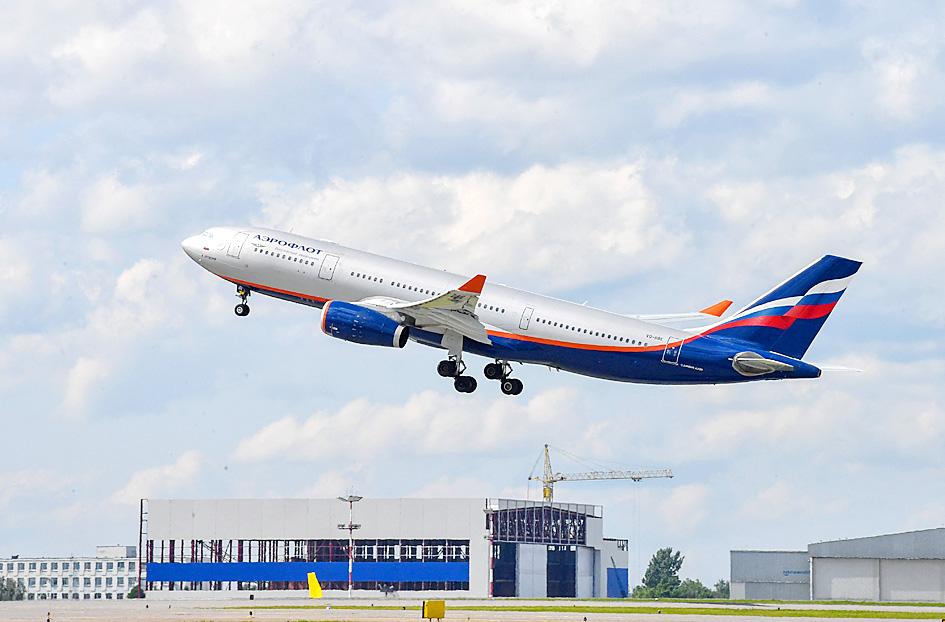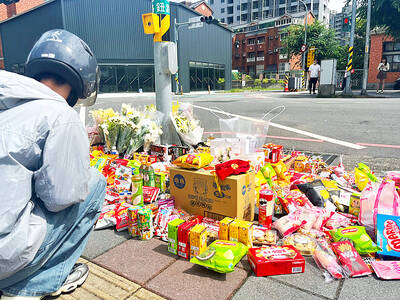Europe and Canada on Sunday said that they would close their airspace to Russian airlines after Russia’s invasion of Ukraine, raising the pressure on the US to do the same.
European Commission President Ursula von der Leyen said the EU would shut down its airspace for planes owned, registered or controlled by Russians, “including the private jets of oligarchs.”
Canadian Minister of Transport Omar Alghabra said that his nation was closing its airspace to all Russian planes to hold the nation accountable for an unprovoked attack on its neighbor.

Photo: AFP
The EU action came after many of its member states had said they were barring Russian planes or planned to do so by Sunday night.
Belgian Prime Minister Alexander de Croo wrote on Twitter that European skies are “open for those who connect people, not for those who seek to brutally aggress.”
A handful of European nations, including Spain, Greece and Turkey, had resisted closing their airspace before Von der Leyen’s announcement.
Robert Mann, an aviation consultant in New York, said the moves by the EU and Canada would put added pressure on the US to also bar Russian flights.
“It is difficult to understand why we are last to move, both operationally and financially,” Mann said.
Transport Canada later said that an Aeroflot flight had breached the prohibition and that it would “not hesitate to take appropriate enforcement action and other measures to prevent future violations.”
As more airlines canceled flights in and out of Russia, and more nations blocked Russian airlines, the US embassy in Moscow said Americans there “should consider departing Russia immediately via commercial options still available.”
Russia has responded to the aviation sanctions by banning flights from several European nations.

Nvidia Corp yesterday unveiled its new high-speed interconnect technology, NVLink Fusion, with Taiwanese application-specific IC (ASIC) designers Alchip Technologies Ltd (世芯) and MediaTek Inc (聯發科) among the first to adopt the technology to help build semi-custom artificial intelligence (AI) infrastructure for hyperscalers. Nvidia has opened its technology to outside users, as hyperscalers and cloud service providers are building their own cost-effective AI chips, or accelerators, used in AI servers by leveraging ASIC firms’ designing capabilities to reduce their dependence on Nvidia. Previously, NVLink technology was only available for Nvidia’s own AI platform. “NVLink Fusion opens Nvidia’s AI platform and rich ecosystem for

WARNING: From Jan. 1 last year to the end of last month, 89 Taiwanese have gone missing or been detained in China, the MAC said, urging people to carefully consider travel to China Lax enforcement had made virtually moot regulations banning civil servants from making unauthorized visits to China, the Control Yuan said yesterday. Several agencies allowed personnel to travel to China after they submitted explanations for the trip written using artificial intelligence or provided no reason at all, the Control Yuan said in a statement, following an investigation headed by Control Yuan member Lin Wen-cheng (林文程). The probe identified 318 civil servants who traveled to China without permission in the past 10 years, but the true number could be close to 1,000, the Control Yuan said. The public employees investigated were not engaged in national

ALL TOGETHER: Only by including Taiwan can the WHA fully exemplify its commitment to ‘One World for Health,’ the representative offices of eight nations in Taiwan said The representative offices in Taiwan of eight nations yesterday issued a joint statement reiterating their support for Taiwan’s meaningful engagement with the WHO and for Taipei’s participation as an observer at the World Health Assembly (WHA). The joint statement came as Taiwan has not received an invitation to this year’s WHA, which started yesterday and runs until Tuesday next week. This year’s meeting of the decisionmaking body of the WHO in Geneva, Switzerland, would be the ninth consecutive year Taiwan has been excluded. The eight offices, which reaffirmed their support for Taiwan, are the British Office Taipei, the Australian Office Taipei, the

DANGEROUS DRIVERS: The proposal follows a fatal incident on Monday involving a 78-year-old driver, which killed three people and injured 12 The Ministry of Transportation and Communications yesterday said it would lower the age for elderly drivers to renew their license from 75 to 70 as part of efforts to address safety issues caused by senior motorists. The new policy was proposed in light of a deadly incident on Monday in New Taipei City’s Sansia District (三峽), in which a 78-year-old motorist surnamed Yu (余) sped through a school zone, killing three people and injuring 12. Last night, another driver sped down a street in Tainan’s Yuching District (玉井), killing one pedestrian and injuring two. The incidents have sparked public discussion over whether seniors